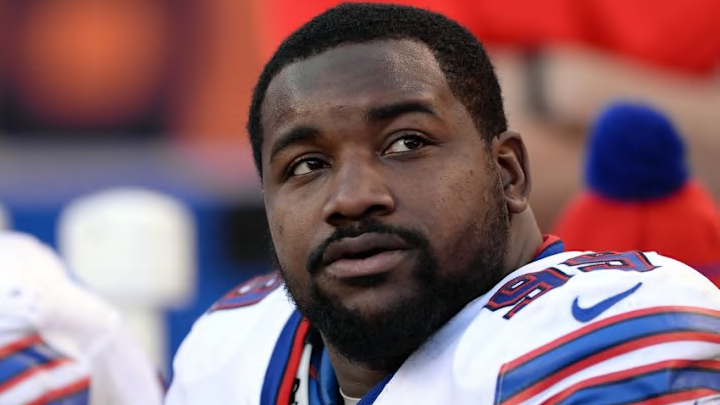Buffalo Bills defensive lineman Marcell Dareus could miss the start to the season due to suspension
With Karlos Williams already expected to sit out four games with a suspension, the Buffalo Bills are looking at a potential fine with the recent revelations surrounding Marcell Dareus.
The 26-year-old defensive tackle is facing a four game suspension for marijuana use.
Bills DT Marcel Dareus is facing a four-game suspension for another violation of the NFL’s substance abuse policy, league sources tell ESPN.
— Adam Schefter (@AdamSchefter) August 16, 2016
#Bills DL Marcell Dareus' looming suspension stems from marijuana, I'm told -- failed or misses drug tests. News came within the last 2 hrs
— Ian Rapoport (@RapSheet) August 16, 2016
Dareus signed a six-year, $96.5 million contract with the Buffalo Bills, which included a $25,000,000 signing bonus, $60,000,000 guaranteed, and an average annual salary of $16,095,686.
More from NFL Mocks
- 2024 NFL Mock Draft Journal: Cardinals, Falcons tank for USC QB Caleb Williams
- Patriots News & Rumors: Ezekiel Elliott talks fun in Foxboro; Mills to Packers?
- Fantasy Football: 5 reasons Colts QB Anthony Richardson can be a top-end option
- Packers’ Lukas Van Ness will make a Lambeau leap into the NFL in 2023
- 2024 NFL Draft: Hunter Haas’ Top 50 Big Board
He is due to earn $7.9 million this season, along with a $7,000,000 signing bonus and a workout bonus $250,000.
The Bills do not have a ton of veteran depth at nose tackle behind Dareus. Corbin Bryant, T.J. Barnes, and Casey Walker are currently listed behind him on the depth chart.
Marcell Dareus’s suspension for marijuana is another instance in a line of protest by current and former NFL players regarding their use of cannabis.
Titans linebacker Derrick Morgan said over the offseason that he feels “like the NFL has a responsibility to look into it, to delegate time and money to research this for its players.”
Ravens offensive lineman Eugene Monroe has also expressed distaste for the leagues’ handling of cannabis products.
Former running back Rickey Williams has been highly outspoken against the policy, and talked to Sports Illustrated about the circumstances around it.
Sports Illustrated also laid out five things in the Collective Bargaining Agreement regarding the league’s drug program.

Still Curtain
"1. The league’s substance abuse policy predates its PED protocol. Commissioner Pete Rozelle first introduced a loose recreational drug code, focused on education, in 1971; the preseason testing structure still used today came into being as part of the ’82 CBA—and suspensions didn’t begin until ’89. Separate language for steroids didn’t appear until ’83.2. Players outside the “intervention program”—those who’ve never had a violation—are tested just once a year. Anyone under contract is tested once between April 20 (yup: 4/20) and Aug. 9. The player is given at most a three-hour warning before being visited by a collector, who must directly witness the player providing the urine sample.3. For every player suspended under the policy, five to 10 others anonymously enter and exit the intervention program. Not even teams are made aware of a player’s positive test until he is suspended, which only occurs after multiple violations. Team physicians, however, have that information in order to prevent cross-medication issues.4. Marijuana is handled differently from all other substances. The discipline procedures for marijuana abusers are less strict than violations for all other drugs. Clause 1.5.2(c) states that an additional offense is allowed before suspensions are leveled in cases involving marijuana. And up until that point, fines for positive tests are less steep.5. Hundreds of people are involved in the program. There are generally two or three clinicians per NFL team who administer treatment plans for each player in the program. Then there’s the legion of agents who help conduct 15,000-plus tests each year. Combined with the steroid program, the NFL spends about $13 million per year on its drug programs."
The Collective Bargaining Agreement is set to end in 2020. Could the 2020 season be held up because of certain players’ stances on marijuana and how it could lead to health benefits rather than recreational use?
Related Story: How Medical Marijuana Could Save NFL In Concussion War
